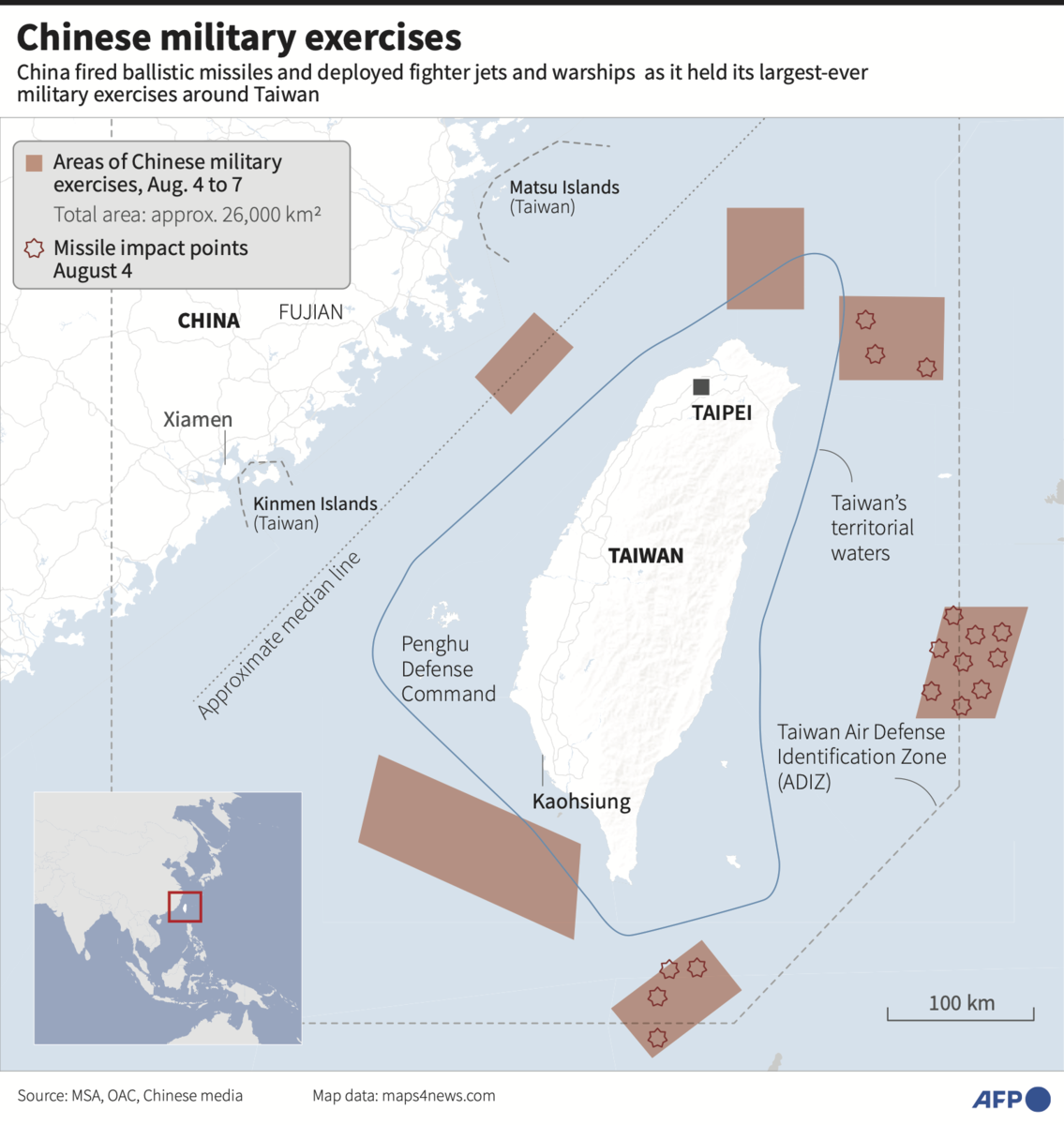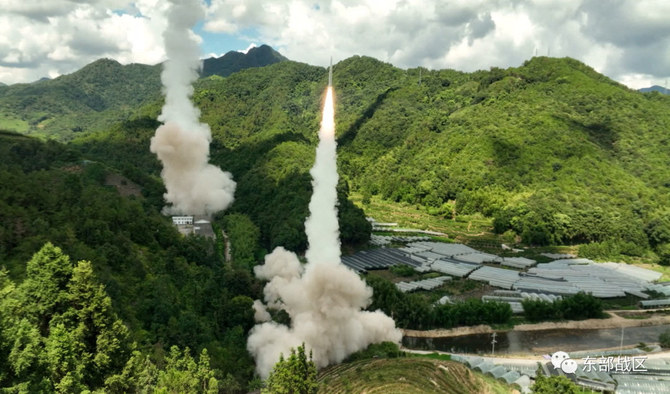PINGTAN, China: The US on Thursday denounced as an "overreaction" and "provocative China's show of force after the Asian superpower fired ballistic missiles and deployed fighter jets around Taiwan, in an angry response over the visit of US House Speaker Nancy Pelosi to the island.
“China has chosen to overreact and use the speaker’s visit as a pretext to increase provocative military activity in and around the Taiwan Strait,” White House spokesman John Kirby told reporters.
“The temperature’s pretty high,” but tensions “can come down very easily by just having the Chinese stop these very aggressive military drills,” he added.
China launched a series of exercises in multiple zones around Taiwan, straddling some of the busiest shipping lanes in the world and at some points just 20 kilometers (12 miles) from the island’s shore on Thursday following Pelosi's stunt.
The US House speaker was the highest-profile US official to visit Taiwan in years, defying a series of stark threats from Beijing, which views the self-ruled island as its territory.
The drills began around 12 noon local time (0400 GMT), and involved a “conventional missile firepower assault” in waters to the east of Taiwan, the Chinese military said.
Taiwan said the Chinese military fired 11 Dongfeng-class ballistic missiles “in several batches” and condemned the exercises as “irrational actions that undermine regional peace.”

Taipei did not say where the missiles landed or whether they flew over the island.
But Japan, a key US ally, said that of the nine missiles it had detected, four were “believed to have flown over Taiwan’s main island.”
Tokyo has lodged a diplomatic protest with Beijing over the exercises, with Defense Minister Nobuo Kishi saying five of the missiles were believed to have landed in his country’s exclusive economic zone.
Taipei’s defense ministry said it had detected 22 Chinese fighter jets briefly crossing the Taiwan Strait’s “median line” during Thursday’s exercises.
AFP journalists on the border island of Pingtan saw several small projectiles flying into the sky followed by plumes of white smoke and loud booming sounds.
On the mainland, at what is said to be China’s closest point to Taiwan, AFP saw a batch of five military helicopters flying at a relatively low altitude near a popular tourist spot.
Beijing has said the drills will last until midday on Sunday.
Beijing has defended the drills as “necessary and just,” pinning the blame for the escalation on the United States and its allies.
“In the face of this blatant provocation, we have to take legitimate and necessary countermeasures to safeguard the country’s sovereignty and territorial integrity,” foreign ministry spokeswoman Hua Chunying said at a regular briefing Thursday.
Military analysts told Beijing’s state broadcaster CCTV that the goal was to practice a possible blockade of the island and contain its pro-independence forces.
“The purpose is to show that the PLA is capable of controlling all the exits of the Taiwan Island, which will be a great deterrent to ‘Taiwan independence’ secessionist forces,” said Zhang Junshe, a senior researcher at China’s Naval Research Institute.
US Secretary of State Antony Blinken said Washington had contacted Beijing “at every level of government” in recent days to call for calm and stability.
“I hope very much that Beijing will not manufacture a crisis or seek a pretext to increase its aggressive military activity,” Blinken told ministers from the 10-member Association of Southeast Asian Nations (ASEAN) in Phnom Penh.
'Stop it', says Japan
Speaking at the same meeting, Japan’s foreign minister called for an “immediate stop” to China’s military drills near Taiwan.
“China’s actions this time have a serious impact on the peace and stability of the region and the international community,” Yoshimasa Hayashi told reporters.
The manoeuvers are taking place along some of the busiest shipping routes on the planet, used to supply vital semiconductors and electronic equipment produced in East Asian factory hubs to global markets.
Taiwan’s Maritime and Port Bureau has issued warnings to ships to avoid the areas being used for the Chinese drills.
The Taiwanese cabinet said the drills would disrupt 18 international routes passing through its flight information region (FIR).
Taiwan’s 23 million people have long lived with the possibility of an invasion, but that threat has intensified under President Xi Jinping, China’s most assertive ruler in a generation.
Analysts said the Chinese leadership is keen to project strength ahead of a crucial ruling party meeting this autumn at which Xi is expected to be given an unprecedented third term, but that China is not aiming to escalate the situation beyond its control — at least for now.
Titus Chen, an associate professor of political science at the National Sun Yat-Sen University in Taiwan, said: “The last thing Xi wants is an accidental war.”


























